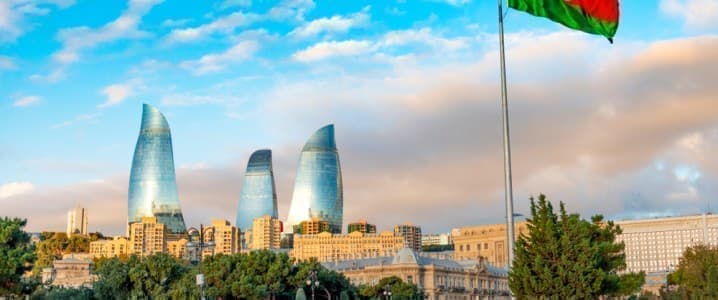Oil rigs just off the coast of Azerbaijan’s capital, Baku, are a constant reminder of what drives this Caspian Sea nation’s economy. Later this year, though, the country’s reliance on fossil-fuel exports will come up against global-warming concerns as Baku plays host to the 29th iteration of the United Nations Climate Change Conference, COP29.
The announcement that Azerbaijan will host COP29 has roiled many climate and human rights activists, who question the nation’s commitments to climate-friendly policies at a time when it relies on fossil fuel revenues and has pursued a far-reaching crackdown on internal dissent. Azerbaijan’s selection comes just a year after similar concerns were raised about holding the conference in the United Arab Emirates.
“This is an economy that is built on oil and gas,” said Kate Watters, director of Crude Accountability, a human rights and environmental watchdog for the Caspian Basin. She added that the country has yet to sign the Global Methane Pledge – an agreement to curb fossil fuel producers’ contribution to global warming – “so it’s kind of behind in its own international commitments.”
The country’s Ministry of Foreign Affairs did not respond to an emailed request for comment from Eurasianet for this article.
Azerbaijan has already caught flak for its initial handling of the conference. In early January, the government named Mukhtar Babayev, who worked for the state oil company for two decades, as COP29 president. Then, President Ilham Aliyev announced that the conference’s organizing committee would be composed of 28 men and no women. After a media firestorm, and attuned to the optics of the situation, he quickly walked back the move and appointed 12 women to the committee.
Hosting the annual climate change conference offers a country the chance to boost its reputation and influence the global climate agenda, according to Tom Pegram, director of University College London’s Global Governance Institute.
But in these sorts of forums, respect for human rights can take a back seat to climate justice concerns. “The two don’t mix very well,” Pegram told Eurasianet. “It’s a little bit like oil and water in some respects.”
That is important considering the political climate in Baku. Late last year, authorities detained multiple journalists from independent media organizations. Then, on February 7, the country held a presidential election that was widely viewed as stage-managed and marred by irregularities.
Tension over the human rights and political conditions – as well as the Nagorno-Karabakh conflict – are fueling conflict between Baku and the Parliament Assembly of the Council of Europe. For Azerbaijan, COP29 offers an opportunity for a reset – to project a modern image and downplay its poor rights practices.
“They can also claim that they’re engaged in a really meaningful way – in a leadership way – in the leading climate negotiations,” Watters, of Crude Accountability, said.
Energy exports could potentially help Baku achieve a reset. Since Russia’s full-scale invasion of Ukraine in 2022, Azerbaijan has emerged as an alternate source of energy exports for Europe, positioning itself to double gas supplies to the continent by 2027.
But Baku’s position as a major supplier is tenuous. The country’s existing gas infrastructure limits its export potential. In addition, the World Bank estimates that Azerbaijan’s Caspian Sea oil reserves will be depleted within about 25 years. Cracks are already beginning to show. Last year, the country’s oil production was 7.4 percent lower than in 2022. (Gas production, conversely, grew.) Future energy export challenges were likely a major factor in prompting the country to adopt “green growth” as one of its five pillars of development by 2030.
While it is too early to say exactly how Azeri leaders will use COP29 as a showcase, investments in renewable energy give some clues.
In 2022, Azerbaijan secured $114 million in loans from European and Asian sources to fund construction by a state-owned Emirati firm of a solar power plant in the country’s east. “This will not only support Azerbaijan’s de-carbonization agenda, but also contribute to European energy security by increasing availability of domestic gas for exports,” the European Bank for Reconstruction and Development said when announcing the loans.
Concerns remain that the country has no plan to wean itself off fossil-fuel export dependency, especially as demand continues to grow.
“There’s a political economy reality now, which is really sort of coming up against… the optimal or the ideal objectives within the climate action agenda,” Pegram said of rising fossil fuel demand disrupting mitigation efforts. “And Azerbaijan can take advantage of that, perhaps.”
By Brawley Benson via Eurasianet.org
More Top Reads From Oilprice.com:
- RBC Predicts Prolonged Challenges in EV Market
- Skyrocketing Battery Mineral Demand Set to Outpace Supply By 2023
- Market Woes Force Glencore to Unload Stake in Major Nickel Mine


















